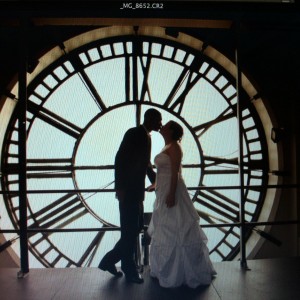
Bridal couple against clock face
They say that every picture tells a story. They also say a picture is worth 1000 words. Of course ‘they’ could be wrong; but I now believe the truth of both sayings. You see, I coach speakers; and I’d recently set up a Facebook page for my forthcoming book The Wedding Speaker’s Handbook.
I needed what Facebook calls a ‘cover photo’; that’s the one that goes right across the screen. So I went immediately to morguefile.com, my current go-to site for finding royalty-free pictures. Or at least reasonably-priced pictures. I typed in the search term ‘weddings’ (no flies on me, no sir). And sure enough there were many pictures that could fit the bill, because if there is one thing that weddings reliably produce (apart from happy families, I hear you say), it’s lots of beautiful photographs.
The clock face
However, I then found a wonderful photo of a bride and groom silhouetted against the background of a large clock-face. That clock-face was back-to-front, so you could imagine that they had been shot inside Big Ben or some similarly impressive clock. So I downloaded that picture; by the way it was taken by a photographer and digital media blogger called Ricky Ochs, from Colorado, to whom many thanks.
The questions
Why do I like that picture? It’s because, when I have a decision to make, I have a favourite rhyme which goes like this:
“I keep six honest serving-men.
They taught me all I knew;
Their names are What and Why and When;
And How and Where and Who.”
(Just So Stories, Rudyard Kipling)
Answering one or more of those questions – which are, of course, open questions – usually helps me decide.
Here’s what I take from that rhyme, for anyone who is going to speak at a forthcoming event, particularly a wedding. Of those six open questions, you certainly know the Where and When. If it’s a wedding, you probably knew the time and the place very well in advance. In fact the idea for The Wedding Speaker’s Handbook came about when a friend first asked me to help him with a speech for his daughter’s wedding; it was more than a year before the big day. And that sort of lead time is not uncommon.
So Where and When are questions that are generally set in stone a long time in advance. Carrying that information around for a year or more is a potential source of stress for the speaker. So what can you do to reduce your stress, if you are that speaker? The answer, briefly, is that you have to start your planning process now, because it is never too early to start planning a wedding speech. And the remaining four questions in that Kipling rhyme will help the process.
In summary, the picture tells a story for wedding speakers; but it also tells a story for me personally. For those speakers, it’s this: from the moment that the date and venue for ‘The Big Day’ have been booked, the clock is running. It’s running for whoever is planning the wedding – whether that’s the couple themselves, or their families, or a professional wedding planner, or a combination of the above – and it’s running for the speakers. How will those speakers use the time?
For me the clock is running too, if I’m going to get this book ready for the publishers on schedule. Back to work!
